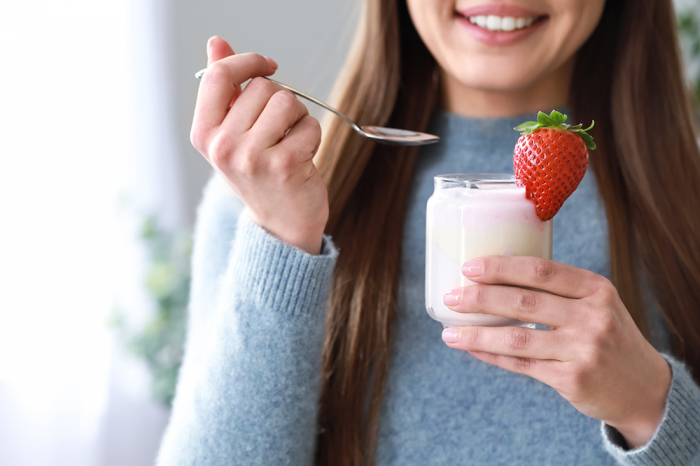“Sneaky sugars are public enemy number one,” according to health expert and author JJ Virgin in her book The Sugar Impact Diet. “Even the most health-conscious among us struggle to know everywhere sugar hides or how to avoid it. It can feel incredibly daunting.”
How hidden sugars are harming your health
Overconsumption can cause kidney and liver damage, dental decay, and obesity, as well as other health issues. This is why The World Health Organization recommends having no more than 5 to 10tsp of free sugars per day.
“Sugar can also have detrimental effects on our heart,” says naturopathic nutritionist Julie Haigh. “Plus, it can be devastating for our gut, as sugary diets can cause an overgrowth of something called candida in the gut. This leads to other health issues, such as fatigue, brain fog, headaches, IBS and depression.”
During menopause, the body is even more sensitive to the imbalances that sugar can cause.
While you don’t have to eliminate sugar completely, you need to choose your sugars wisely, as they are not all equal. Naturally occurring sugars – found in whole fruit, vegetables, milk and other dairy products – aren’t a problem in the same way free sugars are. These raw, unprocessed foods contain countless essential nutrients, and so their health benefits outweigh any negative impact from their natural sugar content. The bad, ‘sneaky’ sugar JJ is referring to is ‘free sugar’. These are added to foods or present in honey, syrups and fruit juices.
“There are more than 50 names for sugar,” admits JJ. “Labels don’t make it easy to spot. Sugar is a chameleon – it’s often not even listed as sugar on the ingredients list. It may be hiding there with names like maltodextrin, barley malt, or fruit juice concentrate.” As a simple rule, anything that ends in ‘ose’ is usually a sugar, such as maltose, dextrose and fructose.
Cutting back on sugar
But what if you cut back? Will you even have a withdrawal?
“Sugar is a drug, and getting off a drug is never easy,” says JJ. “Each time your blood sugar crashes, you’re taken over by cravings, you’re irritable, you have headaches, and you’re shaky and hungry. There’s no way you can get over that, as the symptoms of withdrawal are biologically designed to be diabolical, so you’ll go right back to the drug to which you’re addicted to make them stop.”
Cutting back slowly instead of going cold turkey can help lessen the symptoms, and making sure you’re getting enough sleep can help, too.
Watch out for dried fruit
While fresh fruit contains naturally occurring sugars, dried fruit should ideally be avoided.
“The problem is that when food companies remove the water, they condense the sugar, and they can often add other things, whether it’s sulphur dioxide to preserve colour or syrup to make it even sweeter,” says JJ.
“Even if nothing is added, dried fruit has the same amount of sugar and kilojoules as fresh fruit, but the pieces are so much smaller you’re guaranteed to eat more (and get more sugar) than you would with whole fruit.” So although it’s a convenient, portable snack, be sure to measure your portion of dried fruit, as it can be easy to graze mindlessly on it.
Say no to sweeteners
Although they’re lower in kilojoules, artificial sweeteners aren’t really a healthy way to sweeten your food. “It’s been found that the sweeteners used in diet soft drinks – for example, aspartame, saccharin and sucralose – have been linked to obesity, cardiovascular disease and diabetes,” explains Julie. Other names for artificial sweeteners include isomalt and acesulfame-K.
Sneaky sugar
Thought you didn’t eat much of the sweet stuff? These sources of ‘free sugar’ might surprise you…
✢ Medium muffin 9tsp
✢ Granola 3tsp in 50g
✢ Strawberry yoghurt about 3tsp in 100g
✢ Protein bar 3,5tsp in 50g
✢ Fruit juice 6tsp in 250ml
✢ Tomato sauce 1tsp in 1tbsp
✢ Pasta sauce 2tsp per serving
✢ Baked beans 3tsp in ½ can
More about:













-1747837442.jpg&h=190&w=280&zc=1&q=100)


































